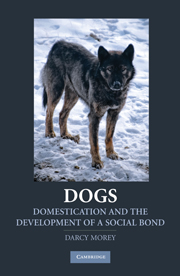Book contents
- Frontmatter
- Contents
- List of Figures and Tables
- Foreword
- Preface and Acknowledgments
- 1 Preamble to the Dog's Journey through Time
- 2 Immediate Ancestry
- 3 Evidence of Dog Domestication and Its Timing: Morphological and Contextual Indications
- 4 Domestication of Dogs and Other Organisms
- 5 The Roles of Dogs in Past Human Societies
- 6 Dogs of the Arctic, the Far North
- 7 The Burial of Dogs, and What Dog Burials Mean
- 8 Why the Social Bond between Dogs and People?
- 9 Other Human-like Capabilities of Dogs
- 10 Roles of Dogs in Recent Times
- Epilogue: One Dog's Journey
- Appendix A
- Appendix B
- References
- Index
5 - The Roles of Dogs in Past Human Societies
Published online by Cambridge University Press: 05 August 2012
- Frontmatter
- Contents
- List of Figures and Tables
- Foreword
- Preface and Acknowledgments
- 1 Preamble to the Dog's Journey through Time
- 2 Immediate Ancestry
- 3 Evidence of Dog Domestication and Its Timing: Morphological and Contextual Indications
- 4 Domestication of Dogs and Other Organisms
- 5 The Roles of Dogs in Past Human Societies
- 6 Dogs of the Arctic, the Far North
- 7 The Burial of Dogs, and What Dog Burials Mean
- 8 Why the Social Bond between Dogs and People?
- 9 Other Human-like Capabilities of Dogs
- 10 Roles of Dogs in Recent Times
- Epilogue: One Dog's Journey
- Appendix A
- Appendix B
- References
- Index
Summary
JUST AS DOGS FULFILL A VARIETY OF FUNCTIONAL ROLES IN TODAY'S societies, they played a wide range of roles in past societies, aside from their role as social companions. The purpose in this chapter is to identify some of the roles that have been at least suggested on logical grounds, and in some cases inferred with great reliability. One should not lose sight of the difference between plausible supposition and secure inference, and it is important to identify which applies best in any given case, though the boundary is not always fully distinct. Quite obviously, one role for which the term “secure inference” definitely applies is that dogs were often objects (or subjects) of deliberate burial at death, and one can reliably say that they fulfilled a mortuary role. That is also an example of a role that they played in past societies that they continue to play in today's societies. In fact, it turns out that the roles played by dogs in the past were much like the ones they now play, allowing for the different twenty-first century setting of today's societies, with all its technology, transportation and communication capabilities, and so on.
DOGS AS A FOOD SOURCE
One of the roles that dogs clearly played in the past seems, at first, to run directly counter to their role as social companions, or friends, a role highlighted by their frequent burial at death.
- Type
- Chapter
- Information
- DogsDomestication and the Development of a Social Bond, pp. 86 - 111Publisher: Cambridge University PressPrint publication year: 2010



